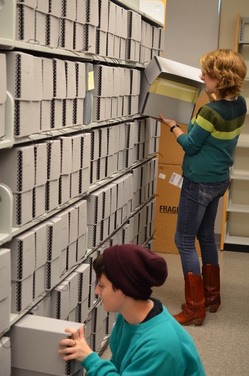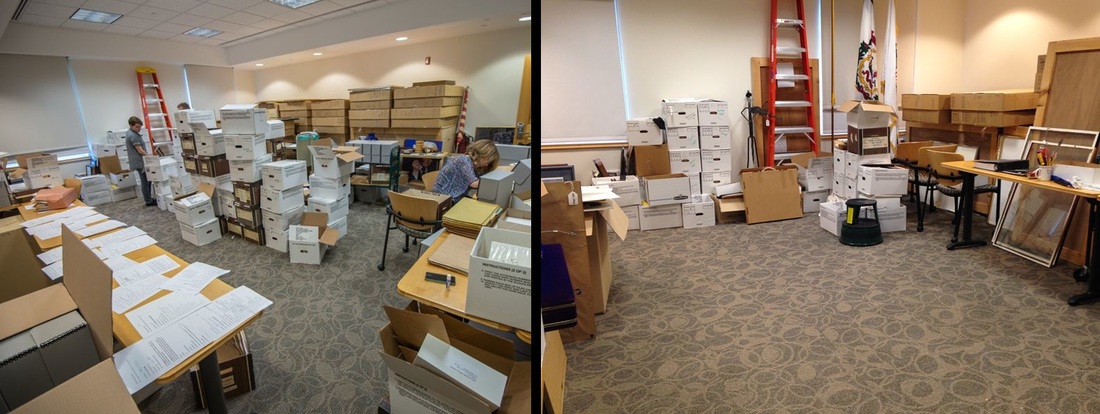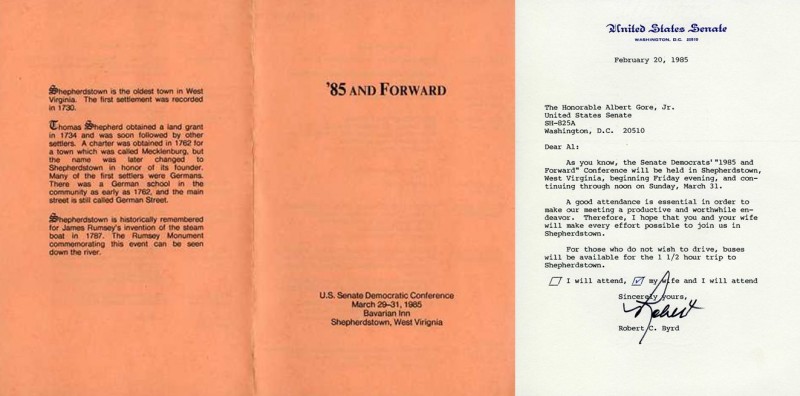|
By Sarah Brennan and Malorie Matos As interns at the Robert C. Byrd Center for Legislative Studies, we’ve had the opportunity to work on many fascinating projects. One of our latest undertakings was the processing of the Press Files Collection from Senator Robert C. Byrd’s Congressional Papers. Byrd’s Press File Series was massive, containing over 50 years’ worth of material. We began processing in February of this year and we are just now coming to the end of the project. Processing is an archival term referring to the act of arranging, rehousing, and describing the papers within a collection. Archival collections must go through processing before becoming accessible for research.  The end result of phase one: the press files rehoused in archival storage. The end result of phase one: the press files rehoused in archival storage. The press files naturally divided themselves into several sub-series, including appropriations, newsletters, campaign, and Charleston press, which we rehoused into acid-free folders and boxes. Once we tackled the sub-series, we moved on to the main press files, which we organized into topical order followed by chronological order. Deciding how to organize such a sizeable collection of documents was challenging. False starts and backtracking plagued the process. Our initial method consisted of pulling files in alphabetical order from the boxes according to inventory sheets that came with the collection. For example, we pulled all of the folders labeled with the letter “A” (such as, “Army” or “Attorney General”) from every box, then we arranged them chronologically within each letter and placed them in acid-free boxes. Soon after starting this process, we realized that we were still finding “A” files long after we’d finished boxing them. We adjusted our work flow and began pulling every folder out and organizing them into piles alphabetically to ensure we don’t miss any letter prior to rehousing. After establishing a working method, we were able to move forward with the bulk of the press series. Although time consuming, this part of our project was one of the most interesting. While processing the topical and chronological files, we discovered items such as personal correspondence from presidents, unpublished photographs, and many other documents that offered a behind the scenes glimpse at the inner workings of Congress. Much of Byrd’s work involved global affairs. In the press files, we found great quantities of information about the Cold War, the War on Terror, and Byrd’s many delegation visits to other nations. Although much of the series was national in scope, Senator Byrd’s attention to West Virginia was also evident. Each sub-series in the press files collection is rife with news stories about the Senator’s efforts to benefit West Virginia. Some examples of West Virginia projects found in the press files included coverage about infrastructure improvements, job growth, and press releases about various West Virginia events. The “1985 and Forward Conference”, held in Shepherdstown, drew congressmen from multiple states and focused heavily on emphasizing in-state businesses. Once we have finished phase one, we will enter all of the files into our Past Perfect database, generate a finding aid, and open the collection for research.
*Update to this Post: Significant progress has been made in the Press Files over the past month. Sarah and Malorie completed the first stage of processing this collection in late November and have now started entering the collection into our database. Comments are closed.
|
Welcome to the Byrd Center Blog! We share content here including research from our archival collections, articles from our director, and information on upcoming events.
Categories
All
Archives
July 2023
|
Our Mission: |
The Byrd Center advances representative democracy by promoting a better understanding of the United States Congress and the Constitution through programs and research that engage citizens.
|
Copyright © Robert C. Byrd Center for Congressional History and Education
|



 RSS Feed
RSS Feed
